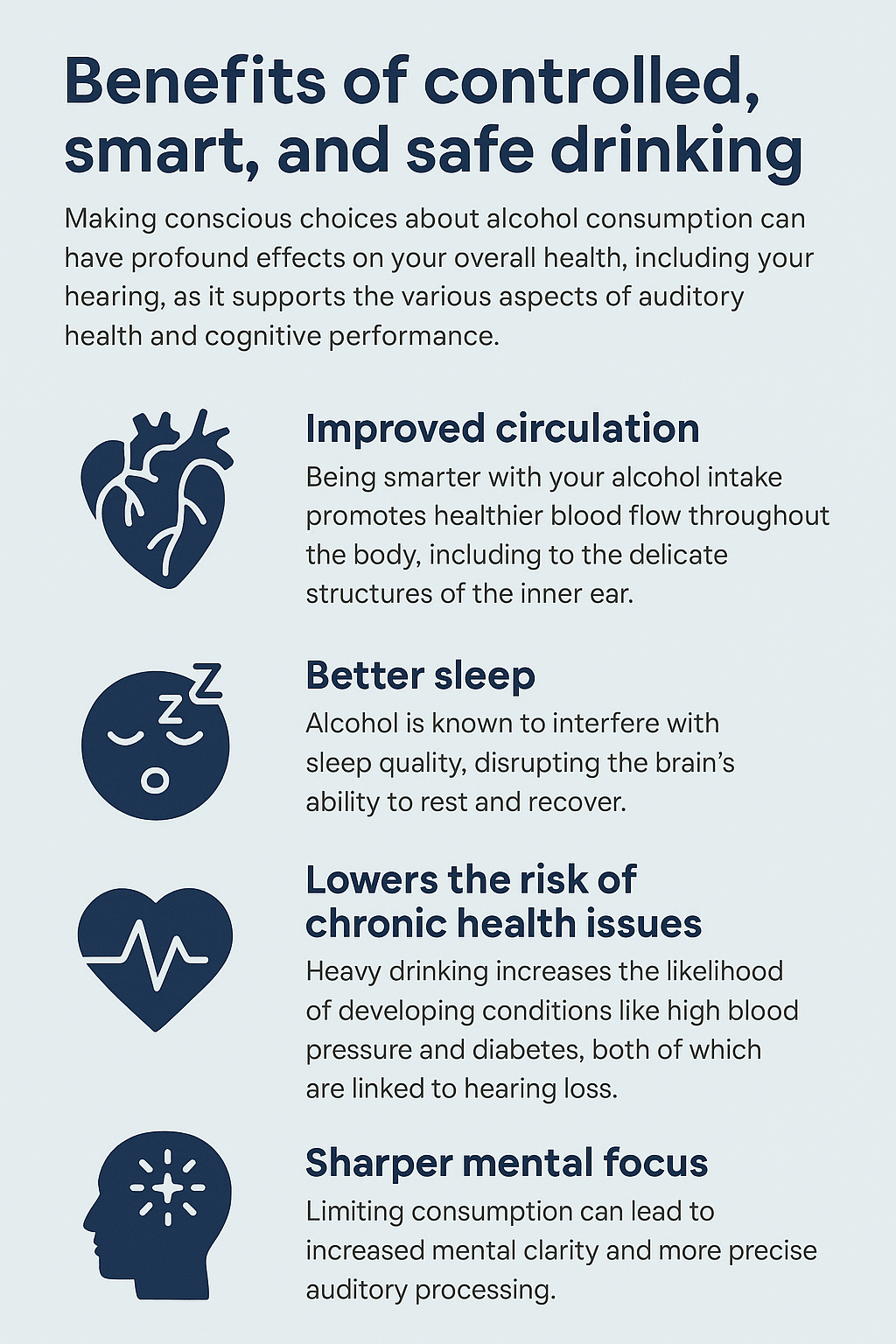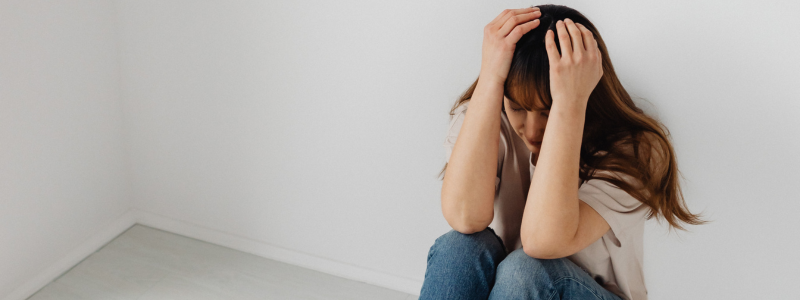
Head of Online Medical Content

Audiology Expert

Drinking and Hearing Loss
The subtle but significant ways in which alcohol can affect hearing
Overview | How alcohol impacts hearing | How your brain functions | How does alcohol affect hearing? | Benefits of smarter drinking | Summary
Last Hearing Aid UK Update:
Overview
This article explains how heavy or chronic alcohol use can damage hearing. Alcohol is an ototoxic substance that harms the inner ear and auditory nerve, leading to issues like hearing loss, tinnitus, and balance problems.
It also affects how the brain processes sound, making it harder to understand speech, especially in noisy settings. Even moderate drinking can reduce auditory clarity.
Choosing to drink less or more mindfully can protect hearing by improving circulation, sleep, focus, and reducing related health risks. In short, smart drinking supports long-term hearing and brain health.
How can alcohol impact our hearing?
It's no secret that chronic alcohol consumption impacts us physically and mentally, but what about our hearing health? Often an overlooked consequence, such consumption can have a negative effect on our auditory system and how our brain processes sound.
Heavy drinking, in particular, can lead to hearing loss and/or tinnitus, which is also called "ringing in the ears".
The effects may not be immediate, but over time, alcohol-related hearing damage can become permanent and significantly impact quality of life, especially if left untreated.
The Office for National Statistics (ONS) reported that over 50% of adults drink alcohol at least once a week, and whilst occasional drinking perhaps doesn't pose concerning health risks, heavy consumption does, and that includes hearing.
In this article, we briefly discuss the subtle but significant ways in which alcohol affects hearing, the brain, and how smarter drinking can protect your future ear health.
Main points:
- A high consumption of alcohol is linked to hearing loss.
- Heavy drinking can impact brain cells, such as the auditory nerve cells.
- The feeling of dizziness from heavy drinking comes from the disorientation in the inner ear, which takes care of balance and hearing.
Alcohol is an ototoxic substance
Due to alcohol being an ototoxic substance, it can cause damage to the ear. This is because chronic alcohol consumption can induce degeneration of the hair cells in the cochlea.
The cochlea's job is to transmit sound signals, but once these cells are damaged, they are unable to regenerate, ultimately leading to sensorineural hearing loss.
These delicate hair cells are essential for converting sound waves into electrical signals that the brain can understand, such as voices and music. Damage here results in not just hearing loss but also distortion of sound and reduced ability to distinguish speech.
Related reading: Ototoxicity and hearing loss
Auditory processing and your brain function
When we look at our auditory cortex, this is in the temporal lobe of your brain that processes sounds, and how alcohol affects it - it slows down the transmission signals. This results in lowering your brain's ability to recognise sound.
In reality, this could be the reason why you might struggle to hear people who talk fast, or distinguish a single voice from another in background noise. Also, a condition that is sometimes mistaken for age-related hearing loss.
Even moderate drinking, the National Institute on Deafness and Other Communication Disorders (NIDCD), states that there is still a reduction of the brain's capacity to interpret and separate speech in noisy environments.
Alcohol can also impact the brain's neuroplasticity, reducing its ability to adapt to auditory challenges, which may accelerate cognitive decline.
Nerve damage, vestibular issues, and balance issues
A high intake of alcohol can damage the central auditory pathway, especially the auditory nerve, which transmits sound data from the cochlea to your brain.
If this level of consumption continues, it increases the risk of communication breakdown, such as hearing and speech understanding.
This type of nerve damage may not always be reversible and can contribute to permanent auditory processing challenges.
Other problems are also happening when we shift to the inner ear, which is responsible for balance through your vestibular system; the fluid in this area can be disrupted due to alcohol.
As hearing and balance are within the inner ear, this causes dizziness and balance problems, which can cause dangerous falls and potentially tinnitus or hearing loss.
Frequent dizziness or vertigo after drinking may be an early warning sign of vestibular dysfunction and should not be ignored. A fact which is backed up by the Vestibular Disorders Association.
Related reading: Hearing loss and dizziness

Benefits of controlled, smart, and safe drinking
Making conscious choices about alcohol consumption can have profound effects on your overall health, including your hearing, as it supports the various aspects of auditory health and cognitive performance. Below are some key benefits:
- Improved circulation: Being smarter with your alcohol intake promotes healthier blood flow throughout the body, including to the delicate structures of the inner ear.
The cochlea, which is vital for hearing, depends on a steady supply of oxygen and nutrients delivered through the bloodstream.
- Better sleep: Alcohol is known to interfere with sleep quality, disrupting the brain’s ability to rest and recover. Prioritising restful, uninterrupted sleep is essential for maintaining strong cognitive functions, including the brain's capacity to process sound efficiently.
- Lowers the risk of chronic health issues: Heavy drinking increases the likelihood of developing conditions like high blood pressure and diabetes, both of which are linked to hearing loss.
Reducing or eliminating alcohol helps decrease your risk of these health problems and their impact on auditory function.
- Sharper mental focus: Limiting consumption can lead to increased mental clarity and more precise auditory processing.
Many people find they can concentrate more easily and distinguish sounds better in noisy settings when alcohol is no longer affecting their nervous system.
Summary
While alcohol may be a part of social gatherings, its impact on hearing health is undeniable. Chronic alcohol consumption can lead to irreversible damage to the auditory system, impairing one’s ability to hear and process sound.
Being smart about your alcohol intake will not only reduce the risk of hearing loss but also instigate better long-term well-being.
Why Choose Us?
- FREE Hearing Tests
- Best Hearing Aids and Prices
- FREE Aftercare for Life
- FREE Home Visits
- 200+ Local Audiologists
- 60 Day Money Back Guarantee
Think you might have hearing loss?
Take the first step toward better hearing health with an audiologist you can trust
If you've noticed changes in how you hear or process sound, it’s okay to seek support.
Speaking with a hearing specialist can be a simple, empowering step toward understanding your hearing health and finding the right care.
We can support your hearing health locally and offer free hearing assessments with a local audiologist, either in a clinic or in your own home, for no extra cost.
Hearing loss awareness articles you might like...
 Hearing aid stigma
Hearing aid stigma  The impact of diet on your hearing
The impact of diet on your hearing  How to tell if hearing loss is permanent or temporary
How to tell if hearing loss is permanent or temporary Our specialist service includes:
Do not spend hundreds of pounds without getting a second opinion from us.
Please call us on 0800 567 7621
 Not only are the prices great, but the service is fantastic! Many thanks to your team.
Not only are the prices great, but the service is fantastic! Many thanks to your team.What's included in our hearing aid prices?
Watch Healthy Hearing's video on drinking and hearing loss below
Common FAQs about hearing aids and hearing loss
In general, any audiologist will always recommend to you the hearing aid model that best suits your needs. Here is a useful checklist to make sure that is the case.
- Audiologist's level of knowledge: The audiologist you have seen will hopefully have a wide knowledge of all available hearing aids; however, some will only be familiar with a small number of brands and, therefore, may not really be in a position to know which model is the best for you. It is OK to challenge their recommendation and ask them to justify why this particular brand is the one for you.
- Do research: Read about the hearing aid that was recommended. Does it seem like it will suit your lifestyle? Does it have more or fewer features than you need?
- Be aware of sales targets: Many high street retailers have specific tie-ins to a particular manufacturer/brand. The hearing aid they have suggested may still be the correct one for you, but do your research so that you know why they might have recommended it.
If you have significant hearing loss in both ears, you should be wearing two hearing aids. Here are the audiological reasons why:
Localisation: The brain decodes information from both ears and compares and contrasts them. By analysing the minuscule time delays as well as the difference in the loudness of each sound reaching the ears, the person is able to accurately locate a sound source.
Simply put, if you have better hearing on one side than the other, you can't accurately tell what direction sounds are coming from.
Less amplification is required: A phenomenon known as “binaural summation” means that the hearing aids can be set at a lower and more natural volume setting than if you wore only one hearing aid.
Head shadow effect: High frequencies, the part of your hearing that gives clarity and meaning to speech sounds, cannot bend around your head. Only low frequencies can. Therefore, if someone is talking on your unaided side, you are likely to hear that they are speaking, but be unable to tell what they have said.
Noise reduction: The brain has its own built-in noise reduction, which is only really effective when it is receiving information from both ears. If only one ear is aided, even with the best hearing aid in the world, it will be difficult for you to hear in background noise as your brain is trying to retain all of the sounds (including background noise) rather than filtering them out.
Sound quality: We are designed to hear in stereo. Only hearing from one side sounds a lot less natural to us.
Fancy some further reading on this topic? You can read about why two hearing aids are better than one in our article, hearing aids for Both Ears, here
For most people, the main benefit of a rechargeable hearing aid is simple convenience. We are used to plugging in our phones and other devices overnight for them to charge up. Here are some other pros and cons:
For anybody with poor dexterity or issues with their fingers, having a rechargeable aid makes a huge difference, as normal hearing aid batteries are quite small and some people find them fiddly to change.
One downside is that if you forget to charge your hearing aid, then it is a problem that can't be instantly fixed. For most, a 30-minute charge will get you at least two or three hours of hearing, but if you are the type of person who is likely to forget to plug them in regularly, then you're probably better off with standard batteries.
Rechargeable aids are also a little bit bigger and are only available in Behind-the-Ear models.
Finally, just like with a mobile phone, the amount of charge you get on day one is not going to be the same as you get a few years down the line. Be sure to ask what the policy is with the manufacturer's warranty when it comes to replacing the battery.
For most people, the answer is yes. But it's never that simple.
The majority of hearing problems affect the high frequencies a lot more than the low ones. Therefore, open fitting hearing aids sound a lot more natural and ones that block your ears up can make your own voice sound like you are talking with your head in a bucket. Therefore, in-ear aids tend to be less natural.
However, the true answer is we can't tell until we have had a look in your ears to assess the size of your ear canal, and until we have tested your hearing to see which frequencies are being affected.
People with wider ear canals tend to have more flexibility, also there are open fitting modular CIC hearing aids now that do not block your ears.
There is also the age-old rule to consider, that a hearing aid will not help you if it's sat in the drawer gathering dust. If the only hearing aid you would be happy wearing is one that people can't see, then that's what you should get.
Most people can adapt to any type of hearing aid, as long as they know what to expect. Have an honest conversation with your audiologist as to what your needs are.
Generally speaking, six or more. Unless it's none at all. The number of channels a hearing aid has is often a simplistic way an audiologist will use to explain why one hearing aid is better than another, but channels are complex, and it is really not that straightforward. Here are some reasons why:
Hearing aids amplify sounds of different frequencies by different amounts. Most people have lost more high frequencies than low, and therefore need more amplification in the high frequencies. The range of sounds you hear is split into frequency bands or channels, and the hearing aids are set to provide the right amount of hearing at each frequency level.
Less than six channels, and this cannot be done with much accuracy, so six is the magic number. However, a six-channel aid is typically very basic with few other features and is suitable only for hearing a single speaker in a quiet room. The number of channels is not what you should be looking at; it's more the rest of the technology that comes with them.
As a final note, different manufacturers have different approaches. One method is not necessarily better than any other. For example, some manufacturers have as many as 64 channels in their top aids. Most tend to have between 17 and 20. One manufacturer has no channels at all.
Manufacturer's warranties typically last between 2-5 years, depending on the brand and model, and cover defects in materials and workmanship. This includes repairs for component failures, electronic malfunctions, and manufacturing defects, but excludes damage from misuse, accidents, or normal wear. Most manufacturers also include loss and damage insurance for the first year.
We handle all warranty claims on your behalf, liaising with manufacturers and ensuring you get replacement devices quickly when needed. This comprehensive warranty coverage, combined with our lifetime aftercare, gives you complete peace of mind.
Our hearing tests are completely free, whether at our clinics or in your home. Unlike other providers who charge £30-£100 for home visits, we believe hearing healthcare should be accessible without financial barriers. Our comprehensive assessments include examination by a registered audiologist, audiogram results, and personalised recommendations.
All testing, future adjustments, and ongoing support are included at no extra cost. While NHS tests are also free, typical 6-week waiting periods often lead people to seek immediate private testing. We provide prompt, professional assessments that fit your schedule and budget.
Yes, we offer completely free home visits throughout the UK, and this service is included in our prices with no additional charges. Home visits are particularly valuable for people with mobility issues, busy schedules, or those who simply prefer the comfort and convenience of their own environment.
Our audiologists can conduct full hearing tests, fit hearing aids, and provide ongoing support in your home. This service sets us apart from many providers who either don't offer home visits or charge extra for them.
We can offer prices up to 40% lower than high street retailers because of our business model. As a network of 200+ independent audiologists, we don't have the massive overheads of large retail chains - no expensive high street premises, no sales targets pushing audiologists to sell the most expensive options, and no costly marketing campaigns.
However, we maintain the same buying power as the big chains because we purchase on behalf of our entire nationwide network. This means you get access to the same premium hearing aids with professional service, but at genuinely competitive prices.
We offer a comprehensive 60-day money-back guarantee, which gives you twice the industry standard time to properly assess whether your hearing aids are right for you. This extended period recognises that adjusting to hearing aids takes time, and your brain needs several weeks to adapt to the amplified sounds.
Unlike many providers who offer just 30 days, we believe 60 days gives you the confidence to test your hearing aids in all the situations that matter to you - from quiet conversations at home to busy restaurants and outdoor activities.
Other pages you might find useful
Ask the Experts
6 Morton Lane
Walkwood
Redditch
Worcestershire
B97 5QA
Latest Launch
When we refer to a product as 'Latest Launch', we mean it is the latest to be released on the market.
New
When we refer to a product as 'New', we mean that the product is the newest hearing aid model on the market.
When we refer to a product as 'Superseded', we mean that there is a newer range available which replaces and improves on this product.
Older Model
When we refer to a product as an 'Older Model', we mean that it is has been superseded by at least two more recent hearing aid ranges.
